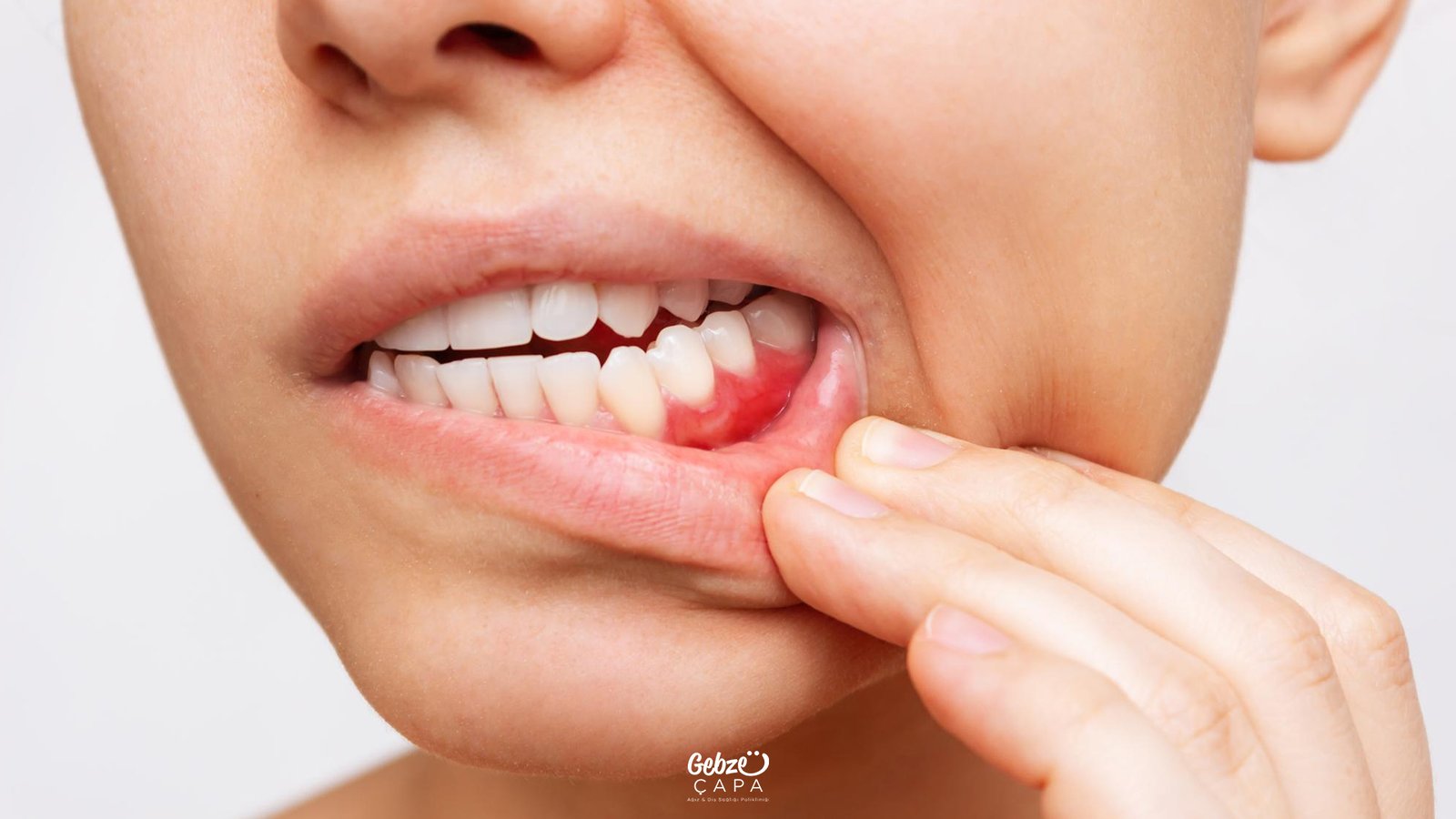What is Good for Gum Sores?
Gum sores are usually unpleasant lesions that occur as a result of irritation, inflammation, or infection of the gums. These sores can have many different causes and often arise due to oral hygiene, dietary habits, or health conditions.
- Oral Hygiene: When good oral hygiene is not maintained, bacteria plaque buildup in the mouth can irritate the gums and lead to gum sores. Measures such as brushing teeth, using dental floss, and regular dental check-ups are important for maintaining gum health.
- Improper Use of Toothbrush: Improper use of a toothbrush carries potential risks that can harm dental and gum health. Particularly, using a toothbrush too harshly or with an incorrect technique can lead to serious issues. One of the main consequences of this improper practice is gum irritation. The stiff bristles of the brush or applying excessive pressure can cause the gums to become red, swollen, and even bleed.
- Gum Diseases: Gum diseases like gingivitis and periodontitis are common problems that can lead to inflammation and injury of the gums. Gingivitis typically begins with mild inflammation and bleeding of the gums and is often associated with poor oral hygiene, plaque buildup, or other infections. If left untreated or uncorrected, gingivitis can progress to periodontitis.

- Poor Dietary Habits: Poor dietary habits can significantly affect gum health and lead to various problems. Factors such as unbalanced nutrition, inadequate intake of vitamins and minerals, or insufficient fluid consumption can weaken the gums and cause damage. In particular, a deficiency in vitamin C can negatively affect gum health. Vitamin C plays a critical role in keeping the gums strong and healthy. In its absence, the gums may weaken, become more sensitive, and even start bleeding.
- Smoking and Alcohol Consumption: Smoking and excessive alcohol consumption are significant risk factors that can cause serious harm to oral health. These habits can contribute to the formation of gum sores by causing inflammation and injury to the gums. Smoking contains many harmful chemicals that negatively affect the health of oral tissues. Toxins in cigarette smoke can irritate the gums and cause inflammation. Additionally, smoking can reduce blood flow to the gums, increasing the risk of gum diseases. Smoking can also weaken the immune system and decrease the ability of gum tissue to heal.
- Stress and Anxiety: Stress and anxiety can have significant effects not only on mental health but also on other systems in the body, including oral health. This can result in serious consequences for overall health, including oral health. Stress and anxiety can weaken the body’s immune system, thereby reducing the resistance of oral tissues to infections. Under stress, the body can suppress the immune system with stress hormones it releases. This can reduce the effectiveness of immune cells that fight bacteria and other pathogens in the mouth. As a result, the gums become more vulnerable to infections, and the risk of inflammation increases. Additionally, some personal care habits caused by stress, such as neglecting brushing or flossing, can contribute to oral health problems.
- Hormonal Changes: Hormonal changes, especially during periods such as pregnancy, menstruation, and menopause, can have various effects on the gums. Hormonal changes during these periods can lead to symptoms such as sensitivity, swelling, and inflammation of the gums. During pregnancy, changes in hormone levels can increase gum sensitivity and make them more prone to inflammation. This can trigger a condition called “pregnancy gingivitis,” which is characterized by symptoms such as redness, swelling, and bleeding of the gums. Additionally, hormonal changes during pregnancy can contribute to the development of gum sores by increasing inflammation in the gums.
- Dental Prosthetics and Intraoral Devices: Dental prosthetics, braces, and other intraoral devices can cause various problems in the gums when improperly fitted or not cleaned properly. In particular, a poorly fitted or crowded dental prosthesis can exert pressure on the gums, leading to irritation and injury. In this case, the gums may become red, swollen, and even bleed.
How to Heal Wounds on Gums?
Gum sores are typically unpleasant lesions that occur as a result of irritation, inflammation, or infection of the gums. These sores can have many different causes and often arise due to oral hygiene, dietary habits, or health conditions.

- Oral Hygiene: When good oral hygiene is not maintained, bacteria plaque buildup in the mouth can irritate the gums and lead to gum sores. Measures such as brushing teeth, using dental floss, and regular dental check-ups are important for maintaining gum health.
- Improper Use of Toothbrush: Using a toothbrush too harshly or incorrectly can damage the gums and lead to injuries, paving the way for gum sores.
- Gum Diseases: Gum diseases like gingivitis and periodontitis can cause inflammation and injury to the gums. If these diseases progress, gum sores can become more severe.
- Poor Dietary Habits: Imbalanced nutrition, inadequate intake of vitamins and minerals, or insufficient fluid consumption can negatively affect gum health. In particular, a deficiency in vitamin C can weaken and injure the gums.
- Smoking and Alcohol Consumption: Smoking and excessive alcohol consumption can negatively affect the health of oral tissues. These habits can contribute to gum sores by causing inflammation and injury to the gums.
- Stress and Anxiety: Stress and anxiety can weaken the body’s immune system, reducing the resistance of oral tissues to infections. This can lead to inflammation and injuries in the gums.
- Hormonal Changes: Hormonal changes during periods such as pregnancy, menstruation, or menopause can cause problems like sensitivity and inflammation in the gums, contributing to the development of gum sores.
- Dental Prosthetics and Intraoral Devices: Improperly fitted or poorly cleaned dental prosthetics, braces, or other intraoral devices can irritate the gums and cause injuries.
Gum sores typically arise from a combination of these factors and, if left untreated, can lead to more serious gum problems. Therefore, it’s important to maintain gum health by regularly visiting the dentist, adopting healthy eating habits, and avoiding stress.


